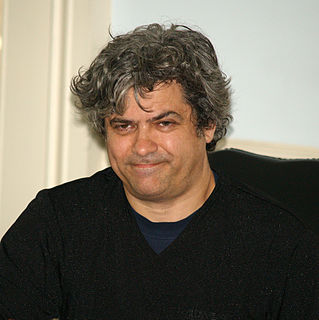A Quote by Ambrose Bierce
COMFORT, n. A state of mind produced by contemplation of a neighbor's uneasiness.
Quote Topics
Related Quotes
It is easier to love humanity as a whole than to love one's neighbor. ... Some of the worst tyrannies of our day genuinely are "vowed" to the service of mankind, yet can function only by pitting neighbor against neighbor. The all-seeing eye of a totalitarian regime is usually the watchful eye of the next-door neighbor. In a Communist state love of neighbor may be classed as counter-revolutionary.
When we speak of a calm state of mind or peace of mind, we shouldn't confuse that with an insensitive state of apathy. Having a calm or peaceful state of mind doesn't mean being spaced out or completely empty. Peace of mind or a calm state of mind is rooted in affection and compassion and is sensitive and responsive to others.
The source of inspiration can be any of the things:deep emotional experiences - say, romantic love or spiritual contemplation.I think such rare moments come only when you have total concentration. You are consumed in and by the music. I guess you could say that it is akin to contemplation. In order to reach this desirable state of mind you have to rise above the environment you're in at that particular time - a bad piano, glaring stage lights, or the attitude of the audience. Sometimes the inspiration of the other musicians you're playing with helps you reach this stage.
There are two kinds of happiness - the temporary pleasure derived primarily from material comfort alone and another more enduring comfort that results from the thorough transformation and development of the mind. We can see in our own lives that the latter form of happiness is superior because when our mental state is calm and happy, we can easily put up with minor pains and physical discomforts. On the other hand, when our mind is restless and upset, the most comfortable physical facilities do not make us happy.
I have said that poetry is the spontaneous overflow of powerful feelings: it takes its origin from emotion recollected in tranquillity: the emotion is contemplated till, by a species of reaction, the tranquillity gradually disappears, and an emotion, kindred to that which was before the subject of contemplation, is gradually produced, and does itself actually exist in the mind.
It is the mind that tells you that the mind is there. Don't be deceived. All the endless arguments about the mind are produced by the mind itself, for its own protection, continuation and expansion. It is the blank refusal to consider the convolutions and convulsions of the mind that can take you beyond it.
































